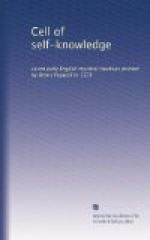For because that there be divers kinds of spirits, therefore it is needful to us discreet knowing of them; sith it so is that we be taught of the apostle saint John not to believe to all spirits.[278] For it might seem to some that are but little in conning, and namely of ghostly things, that each thought that soundeth in man’s heart should be the speech of none other spirit but only of man’s own spirit. And that it is not so, both belief and witness of holy scripture proveth apertly; for “I shall hear,” saith the prophet David, “not what I speak myself, but what my Lord God speaketh in me";[279] and another prophet saith, that an angel spake in him.[280] And also we be taught in the psalm that the wicked spirits sendeth evil thoughts in to men; and over this, that there is a spirit of the flesh not good, the apostle Paul sheweth apertly, where he saith, that some men are full blown or inflate with the spirit of their flesh.[281] And also that there is the spirit of the world, he declareth plainly, where he maketh joy in God, not only for himself, but also for his disciples, that they had not taken that spirit of the world, but that that is sent of God, the which is the Holy Ghost.[282] And these two spirits of the flesh and also of the world are, as it were, servants or sergeants of that cursed spirit, the foul fiend of hell; so that the spirit of wickedness is lord of the spirit of the flesh, and also of the spirit of the world. And which of these three spirits that speaketh to our spirit, we should not believe them. For why, they speak never but that anon, by their speaking, they lead to the loss both of body and of soul. And which spirit it is that speaketh to our spirit, the speech of that same spirit that speaketh shall fully declare; for ever more the spirit of the flesh speaketh soft things and easy to the body; the spirit of the world vain things and covetise[283] of worship; and the spirit of malice of the fiend speaketh fell things and bitter.
Wherefore, as oft times as any thought smiteth on our hearts of meat, of drink, and of sleep, of soft clothing, of lechery, and of all other such things the which longeth to the business of the flesh, and maketh our heart for to brenne[284] as it were in a longing desire after all such things; be we full siker that it is the spirit of the flesh that speaketh it. And therefore put we him away, in as much as we goodly may by grace, for he is our adversary. As oft times as any thought smiteth on our hearts of vain joy of this world, kindling in us a desire to be holden fair, and to be favoured, to be holden of great kin and of great conning, to be holden wise and worthy, or else to have great degree and high office in this life—such thoughts and all other the which would make a man to seem high and worshipful, not only in the sight of others, but also in the sight of himself—no doubt but it is the spirit of the world that speaketh all these, a far more perilous enemy than is the spirit of the flesh, and with much




